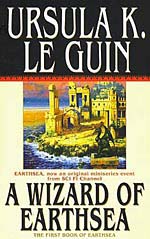
![]() bazhsw
bazhsw
11/9/2024
![]()
Sadly I was a little disappointed with this, and maybe it's reputation preceded it somewhat raising my expectations.
I've had my eye on reading this for a few decades based on it's reputation and also enjoying Le Guin and how she looks at worlds, and I know this is an important novel that has influenced the 'magical child wizard' trope that seems incredibly pervasive today. It's also an important book in the fantasy canon, with an evocative world and map, a rich range of cultures and a sense of a grand story.
'A Wizard of Earthsea' feels quite a well-trodden story now, though it perhaps wasn't in the late 1960's when published. Sparrowhawk is a young poor child, who it is discovered has an affinity for magic. He's discovered by a wizardly mentor, and after a few things happen goes to wizard college, and then some other things happen and he leaves to face up to a challenge, travelling the world, getting into some scrapes and finally resolving what he set out to do.
Earthsea as a world is certainly well developed, at least in Le Guin's mind. It is largely an archipelago of lots of little islands surrounded by seas, and each island or groups or islands seem to have their own unique culture. We are teased of so much for these cultures, their customs and languages. There is a real sense of a world, with frozen towers in the North and islands at the edge of the world.
The theme of the book is generally about Sparrowhawk finding himself, who he is, understanding his darkness and his light. I get that the book was aimed at a young adult audience but a lot feels quite telegraphed, particularly about the 'shadow' Sparrowhawk unleashes. So much of the novel is about telling him he will be a mighty mage and that his future is unknown, but light and darkness are both in his future. The reader can see him being guided and coached throughout in these lessons.
Where I am struggling with the book is that characters are introduced for a chapter and then forgotten for the rest of the book, entire cultures are described and we get to see something of them, before we pass them only to never see them again. There feel like countless islands where he lands, gets treated to food, drink and rest because he is a wizard, casts a few spells to help the locals then moves on. They mould into each other really. I get that this is 'his journey', and 'his learning' but it isn't that interesting.
There are quite a lot of things which happen, and there is no build up of drama and Sparrowhawk resolves things easily. He also does some pretty stupid stuff repeatedly, is forgiven, really doesn't suffer any consequences and moves on. Again, as a device for growing up it works, but as a novel it feels kind of frustrating.
I kind of feel that a lot of characters dip in and I know I won't see them again unless I read a follow-up book. Likewise, I feel like I have seen most of the world in the short book. We hear how places are remote and no-one has been there for decades and yet it doesn't feel like Sparrowhawk ever has to try hard to get anywhere. I think if the book needed to be short, then it needed to have fewer places to go.
I also found I didn't like the central character from the start, and I guess when that happens it is hard to stay engaged.
It's also interesting reading this over fifty years after publication that there are little things Le Guin put in to be different - such as the characters skin colour and the different races and cultures. Le Guin in her notes suggests that you'd only realise Sparrowhawk wasn't white half way through the book. I spotted it in the first few pages, which I don't think is down to my reading ability, but perhaps more that 'white defaults' may be not as ingrained as in the past.
I can see how this book could have been special for it's audience in the past, but I guess it's not for me.